Paris: Thru the Art-Route
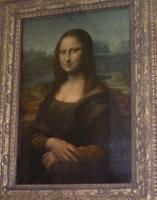
With around 60 museums and galleries to choose from, to say even one or two of those can overwhelm and exhaust you, would be an understatement. But o'course, practically, you either do the duty of Louvre and one or two others, depending on your priority and interest, or if you happen to have some items in your mind which you don't want to miss, you just go after those- checking out only those few things which you really want to see. I opted for the later.

Thought of visiting the Italian Paitings and sculpture section in Musée Louvre, and following on with a dekko at Musée d'Orsay, and if time permits, to Musée National d'Art Moderne (Pompidou Centre), to maintain a chronological continuum-- Musee d'Orsay has collections of works produced between 1848 and 1914; Louvre covers from pre-historic till that time; And the Pompidou Centre museum has contemporary/modern stuff, taking over from the period covered in Musee d'Orsay. Finally ruled out Pompidou Centre because of lack of time.
 Other place in my list was Musée Rodin- To see Auguste Rodin's celebrated sculptures 'The Thinker', 'The Kiss', 'The Hand of God', 'The Gates of Hell' etc. of which I had read about. There was a full size bronze replica of The Thinker in Samsung's Korea HQ visitor's lounge/reception area. 2years ago, they distributed a booklet to all employees, with descriptions of all the art objects displayed in the office and premises, also with introduction of the artists. That was interesting.
Other place in my list was Musée Rodin- To see Auguste Rodin's celebrated sculptures 'The Thinker', 'The Kiss', 'The Hand of God', 'The Gates of Hell' etc. of which I had read about. There was a full size bronze replica of The Thinker in Samsung's Korea HQ visitor's lounge/reception area. 2years ago, they distributed a booklet to all employees, with descriptions of all the art objects displayed in the office and premises, also with introduction of the artists. That was interesting.On the previous visit, after reaching the Moulin Rouge area in the late evening, came to know that the Musée de l'Érotisme a few blocks from it it is open late. So decided to have a curious peep into it. Apart from the expected risque and the risible stuff, some worth a good laugh, the real interesting stuff were those artefacts related to the rituals of the ancient tribes from Southeast Asia to the Aztecs of Latin America, some of which were used for appeasing the gods and goddesses of procreation in those cultures.
Then there are places -- Maison Européenne de la Photographie(Photography Museum), and Musée du Vin(Wine Museum)--that I planned to visit but missed to make it in time . By the time I managed to reached there, they were within half an hour of closing and hence entry restricted :(.
My 'collection':
Photos of the original works from Musée d'Orsay :
Main attraction here, are the paintings of the genres The Impressionism ( Monet, Renoir, Manet, Pissaro etc.) and post-Impressionism (van Gogh, Cézanne etc. ) .
[I've uploaded these and other photos, with more descriptions to flickr album. ]
Impressionism:
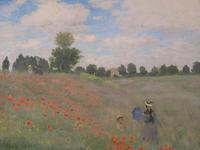 Poppies at Aregenteuil. Claude Monet.
Poppies at Aregenteuil. Claude Monet.
HarmonieRose, Le Bassin aux nymphéas. Claude Monet
 La Cathedrale de Rouen, HarmonieBleue. Claude Monet .
La Cathedrale de Rouen, HarmonieBleue. Claude Monet .Monet did series of 30 paintings of the cathedral facade, capturing changing patterns of light on the same scene.
2 months back, during my Rouen trip (North Normandy, France), I's lucky to get to watch the amzing late-night light show at Rouen Cathedral, "The Cathedral, from Monet to pixels", in which paintings and digital patterns from Monet's paintings of the cathedral are projected onto the enormous facade of the cathedral.

Paris Rue Montorgeuil ,30Jun1878. Claude Monet.

Houses of Parliament, London. Claude Monet.
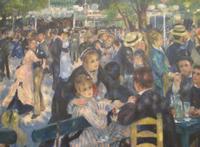 Dance at 'Le Moulin de La Galette', Paris.
Dance at 'Le Moulin de La Galette', Paris.Pierre Auguste Renior.
(More about it)
Post-Impressionism:
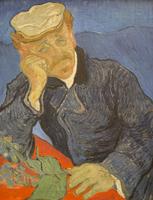 Portrait of Dr Gachet. 1890. Vincent van Gogh.
Portrait of Dr Gachet. 1890. Vincent van Gogh.(In May 1990, the first version of Portrait of Dr Gachet was auctioned for a record $82.5 million at Christie's, New York, acquired by a Japanese Industrialist. At that time, it became the costliest painting ever sold.)
During the last few months of van Gogh's life, before he shot himself to death at 37, Dr Gachet took care of him.
Gachet's melancholy was an essential aspect of the man, and through the physicians' pose and agonized features Van Gogh synthesized what he described to Gauguin as "the heartbroken expression of our time."
 Starry Night Over the Rhone. 1888. Vincent van Gogh.
Starry Night Over the Rhone. 1888. Vincent van Gogh. The Church at Auvers. 1890. Vincent van Gogh.
The Church at Auvers. 1890. Vincent van Gogh. La Sieste. 1890. Vincent van Gogh.
La Sieste. 1890. Vincent van Gogh.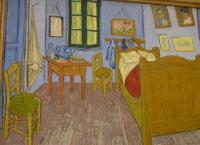 La chambre de Van Gogh à Arles (Van Gogh's Room at Arles) 1889.
La chambre de Van Gogh à Arles (Van Gogh's Room at Arles) 1889.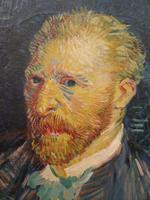 Self Portrait. Vincent van Gogh.
Self Portrait. Vincent van Gogh.(b. March 30, 1853, Zundert, Netherlands--d. July 29, 1890, Auvers-sur-Oise, near Paris)
He strongly influenced Expressionism.

